
International Community Welcome Day. Photo by: Gustavo Diehl/Agecom/UFSC
On Monday, 10 March, the Universidade Federal de Santa Catarina (UFSC) hosted a Welcome Day for international students joining the institution in the first semester of 2025. Organized to welcome both degree-seeking and exchange students, the event featured a diverse program focused on integration and cultural exchange.
The International Community Welcome Day targeted undergraduate students arriving through programs managed by the Office of International Relations (SINTER): the Incoming and AUGM Escala Grado exchange programs, as well as the Programa Estudantes-Convênio de Graduação (PEC-G) for international degree-seeking students. Additionally, study buddies who assist with their adaptation to university life also took part in the activities.
Welcome Day program
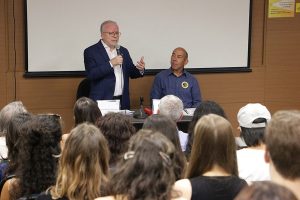
The Rector of UFSC and the Secretary for International Relations at the welcome ceremony for international students. Photo by: Gustavo Diehl/Agecom/UFSC
The Welcome Day began with specific orientation sessions at 9 am, at the School of Philosophy and Human Sciences (CFH). In the afternoon, at 1:30 pm, students gathered for a welcome ceremony, which featured an address by Rector Irineu Manoel de Souza.
During the ceremony, the Secretary for International Relations at UFSC, Luiz Carlos Pinheiro Machado Filho, provided an overview of the university’s structure and the services available to the international community.
Every year, UFSC expands its international student community. Today, there are nearly 4,000 students coming to the University through different admission pathways, including the Entrance Exam. This “makes us very happy, because our university is recognized both nationally and internationally. In some rankings, it is the fourth-best university in Brazil. In Santa Catarina state, it is the top-ranked university, and in Latin America, it receives strong evaluations. This reflects our commitment to internationalization and to welcoming students from all around the world”, said the Rector.
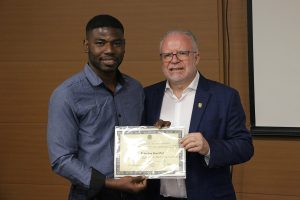
The Rector of UFSC presents an undergraduate diploma in Medicine to Richardson Yonel Civil, a PEC-G graduate from Haiti. Photo by: Gustavo Diehl/Agecom/UFSC
A highlight of the ceremony was the presentation, by the Rector, of an undergraduate diploma in Medicine to Richardson Yonel Civil, a PEC-G graduate from Haiti. On the occasion, the Secretary for International Relations addressed the audience, emphasizing that this long-standing program, run by the Brazilian government, enables international students from participating countries in the Americas, Africa, and Asia to earn their degrees at UFSC free of charge. “It is a form of cooperation and solidarity that Brazil maintains with countries facing similar socioeconomic challenges to ours,” explained the Secretary.
Following the ceremony, participants enjoyed a welcome coffee and two cultural performances: Angolan dances Kizomba and Semba, performed by members of ASSAF; and a percussion show by the student band Devassa, organized by members of the Medicine Student Athletic Association.
After the cultural performances, students who registered for integration activities took part in various experiences, including: a visit to the São José da Ponta Grossa Fortress; dance workshops with the Samba Manezinho Group and ASSAF; and a guided campus tour led by the SINTEGRA project, a partnership between SINTER and the Department of Psychology at UFSC.
Diversity among international students
This semester, UFSC is welcoming 88 undergraduate students from 15 countries through academic mobility programs. Among them, 69 students are part of the Incoming Program, coming from partner universities, primarily in France (24 students), Portugal (9) and Italy (7). Other students are part of the AUGM Escala Grado Program, coming from member universities of the Association of Montevideo Group Universities (AUGM), specifically in Argentina (6) and Uruguay (2).
Additionally, 15 international degree-seeking students were admitted through the PEC-G program. On the Florianópolis campus, eight students joined programs such as Chemical Engineering, Medicine, Administration and International Relations. Their countries of origin include Angola, Cape Verde, Guinea-Bissau and Paraguay.
On the Joinville campus, four PEC-G students began their studies in Aerospace Engineering, Railway and Metro Engineering, and Naval Engineering, coming from Mozambique, Honduras, Angola and Equatorial Guinea. On the Araranguá campus, three PEC-G students enrolled in Computer Engineering, Energy Engineering, and Medicine, representing Angola, Mozambique and Equatorial Guinea.
Institutional Welcome and Support
The International Community Welcome Day was organized by SINTER, with support from the Institutional Program for Educational Support to Students (PIAPE) of the Prorectorate for Undergraduate Studies and Basic Education (PROGRAD); the Department of Culture, Art and Sports (SecArte); the SINTEGRA outreach project, which seeks to promote the integration of international students into campus life; ASSAF; and the Samba Manezinho dance group.
In addition to students in mobility programs, UFSC also welcomes international degree-seeking students admitted through external transfer or the university entrance exam, reinforcing its commitment to internationalization and academic diversity.
With the arrival of students from different countries and cultures, UFSC strengthens its mission to promote the internationalization of higher education. This diversity enriches academic and cultural experiences, fosters mutual learning and strengthens ties between nations.
For more information about mobility programs and support for international students, visit the SINTER website.
See more photos of the event on the UFSC Rectorate website.
Written by Rosiani Bion de Almeida, SECOM/UFSC, with information from SINTER.
Translated by SINTER/UFSC
Read the original article here.
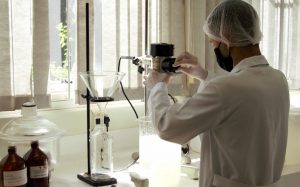





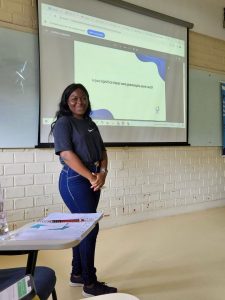
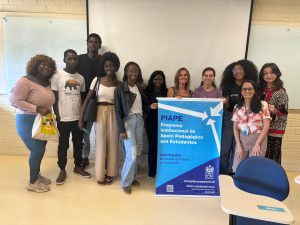
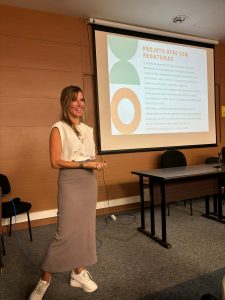


 The Universidade Federal de Santa Catarina is ranked as the 8th best university in Brazil in the
The Universidade Federal de Santa Catarina is ranked as the 8th best university in Brazil in the  The Times Higher Education (THE), a British magazine specializing in higher education, released the results of the
The Times Higher Education (THE), a British magazine specializing in higher education, released the results of the 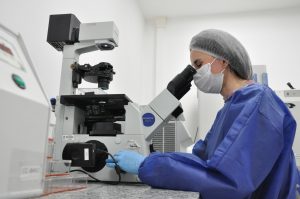
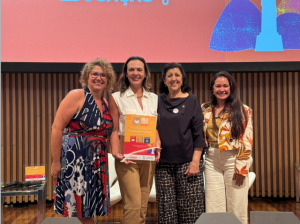




 The Universidade Federal de Santa Catarina (UFSC) has been ranked 5th among the most sustainable universities in Brazil in the QS World University Rankings: Sustainability 2025. The ranking, released on 10 December, evaluates higher education institutions worldwide based on three key categories: environmental impact, social impact, and governance.
The Universidade Federal de Santa Catarina (UFSC) has been ranked 5th among the most sustainable universities in Brazil in the QS World University Rankings: Sustainability 2025. The ranking, released on 10 December, evaluates higher education institutions worldwide based on three key categories: environmental impact, social impact, and governance.